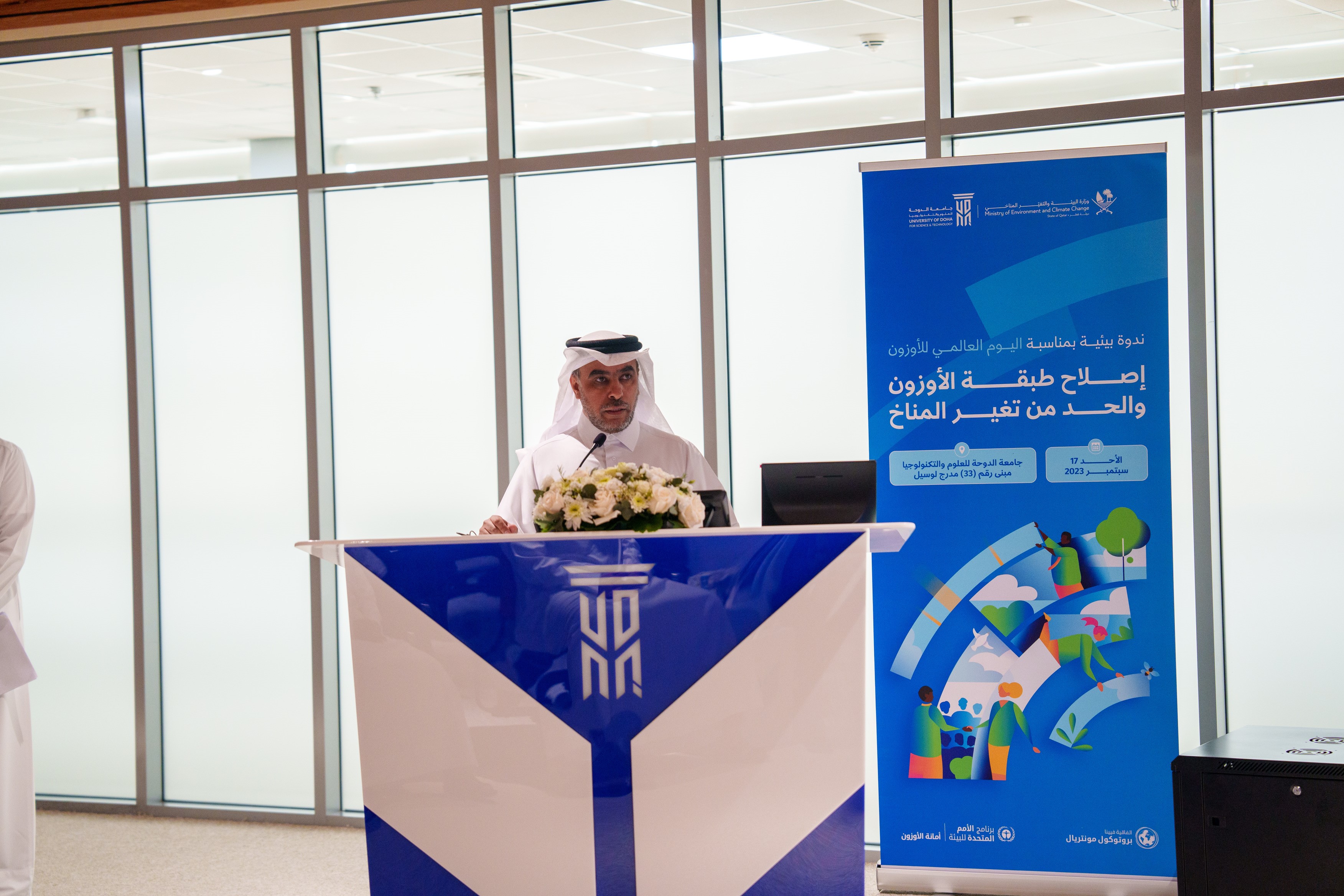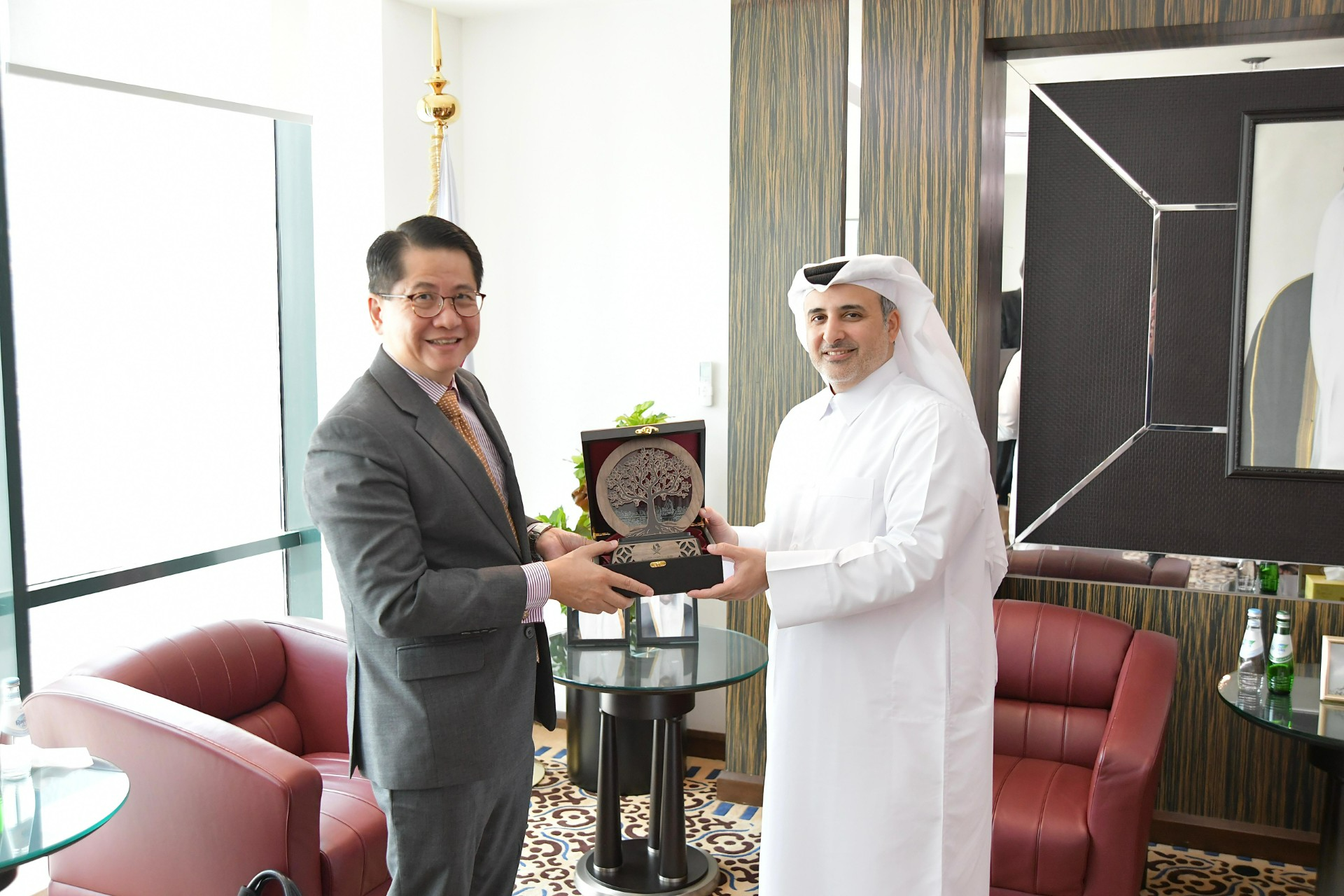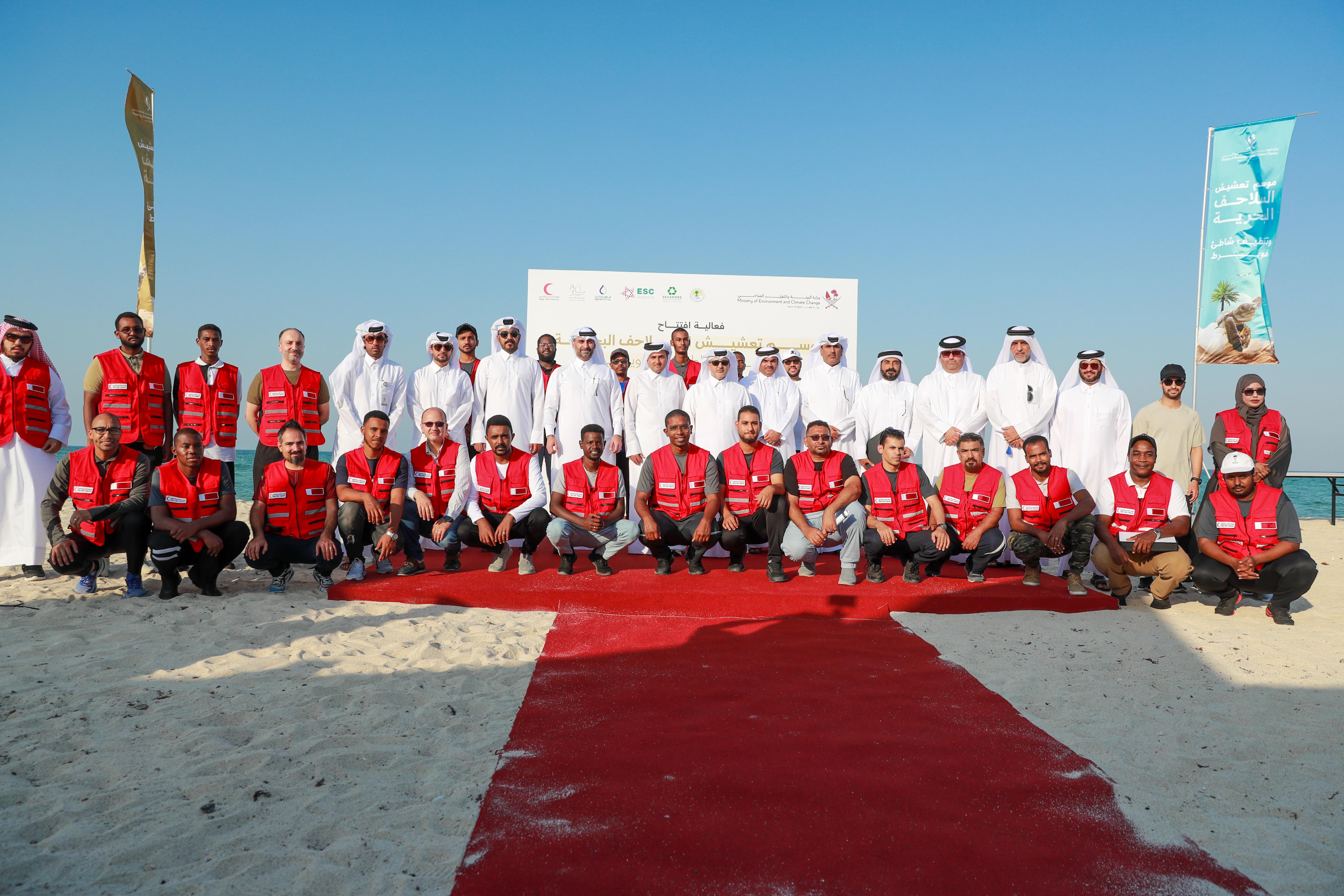
Under the slogan “Ozone Layer Protection and Climate Change Mitigation,” the Ministry of Environment and Climate Change celebrates the World Ozone Day
This morning, the Ministry of Environment and Climate Change organized an environmental seminar in celebration of World Ozone Day under the slogan “Ozone Layer Protection and Climate Change Mitigation,” in collaboration with the University of Doha for Science and Technology.
The seminar discussed the risks that threaten the ozone layer and their impact on the environment and climate changes, such as global warming, which leads to various crises and natural disasters like hurricanes and floods. Additionally, the workshop addressed Qatar’s efforts in preserving the ozone layer and its commitment to implementing all provisions of the “Montreal Protocol” and the “Vienna Convention.”
The seminar was attended by Mr. Abdulhadi Nasser Al-Marri, the Assistant Undersecretary for Environmental Affairs at the Ministry, Dr. Salem bin Nasser Al-Naimi, President of the University of Doha for Science and Technology, Mr. Khaled Klalei, the Regional Coordinator for the Montreal Protocol in West Asia, United Nations Environment Programme, as well as several representatives from government agencies and companies related to the sector.
In his speech at the seminar, Mr. Abdulhadi Al-Marri, the Assistant Undersecretary for Environmental Affairs, emphasized that World Ozone Day represents an important opportunity to unify collective efforts in addressing the issue of ozone layer protection, which is one of the most complex environmental challenges. He highlighted the necessity for international collaboration to confront this challenge.
He explained that the establishment of World Ozone Day aims to raise awareness among people about the importance of preserving this layer, as well as to educate them about the substances that deplete it. He emphasized the urgent need to reduce the use of such substances that lead to its depletion. He also pointed out that organizing seminars like this reflects the commitment of the Ministry of Environment and Climate Change to the importance of preserving and protecting this ozone layer.
During his speech, the Assistant Undersecretary for Environmental Affairs also discussed Qatar’s efforts in preserving the ozone layer. Qatar is committed to the Vienna Convention on the Protection of the Ozone Layer and the Montreal Protocol on substances that deplete the ozone layer. He mentioned that the Ministry has launched a plan for the gradual phase-out of these substances. Additionally, the Ministry is actively keeping up with important developments related to the control and regulation of these substances and their alternatives.
Mr. Abdulhadi Al-Marri called upon governments, organizations, and individuals to collaborate in protecting the ozone layer, promoting the use of alternative materials, and transitioning to more sustainable practices. He emphasized the importance of supporting scientific research to develop new and innovative environmental technologies.
In his speech at the seminar, Dr. Rashid bin Al-Omari, Deputy President of the University of Doha for Science and Technology for Academic Affairs, emphasized that decisions and actions based on science are among the most important factors contributing to solving major crises. He cited the Vienna Convention and the Montreal Protocol as examples of agreements rooted in science that have helped reduce the use of substances harmful to the ozone layer.
He also noted that the University of Doha for Science and Technology is dedicated to sustainability, promoting green research initiatives, launching pioneering programs in these fields, and fostering an environmental culture among students and the academic community.
The Deputy President of the University of Doha for Science and Technology emphasized that this environmental seminar would serve as a significant addition to the efforts towards developing a generation with greater awareness and knowledge of global challenges. He noted that this generation will be capable of preserving the planet and meeting the requirements of sustainable economics in line with Qatar’s vision for 2030.
In the same context, Mr. Khaled Klalei, the Regional Coordinator for the Montreal Protocol in West Asia, United Nations Environment Programme, commended the efforts of the Ministry of Environment and Climate Change. He praised their commitment to meeting the requirements of the Montreal Protocol and achieving the established goals for the gradual phase-out of restricted substances. He also acknowledged the need for specialized workshops to raise awareness and build capacity for enforcing the pioneering legislation enacted by the country.
During his speech at the seminar, he emphasized the importance of building upon the significant benefits already achieved for both the ozone layer and the climate under the Montreal Protocol. This is achieved through the gradual phase-out of substances harmful to the ozone layer and efforts to achieve the goals of the Kigali Amendment for the gradual reduction of hydrofluorocarbon (HFC) production and consumption. He pointed out that World Ozone Day provides an opportunity to showcase and disseminate the successes and new developments of the Protocol, as well as to increase public support and engagement of key stakeholders in Qatar’s national compliance strategy.
Mrs. Mona Al-Emadi, Head of the Hazardous Materials Department and Ozone Officer at the Ministry of Environment and Climate Change, presented at the seminar. During her presentation, she discussed the importance of ozone layer and its significance, as well as the role of individuals and communities in its preservation. She also warned about the effects of ozone layer depletion on both humans and the environment.
Mrs. Mona Al-Emadi also presented the Ministry of Environment and Climate Change’s project for the gradual phase-out of HCFCs (Hydrochlorofluorocarbons). This is achieved through the adoption of Ministerial Decision No. 20 of 2022, which regulates the mechanism for importing hydrofluorocarbon substances and specifies the total annual quantity allowed for importation into Qatar in accordance with the regulatory limits of the Montreal Protocol and the mandatory requirements for the country. She also emphasized the commitment of importing companies to their allocated quotas for importation.
Furthermore, the Ministry of Environment and Climate Change introduced a competition for school and university students to encourage their participation in awareness programs. In addition to this, they also honored the participants in the seminar and recognized outstanding companies that collaborated with the ozone team.


